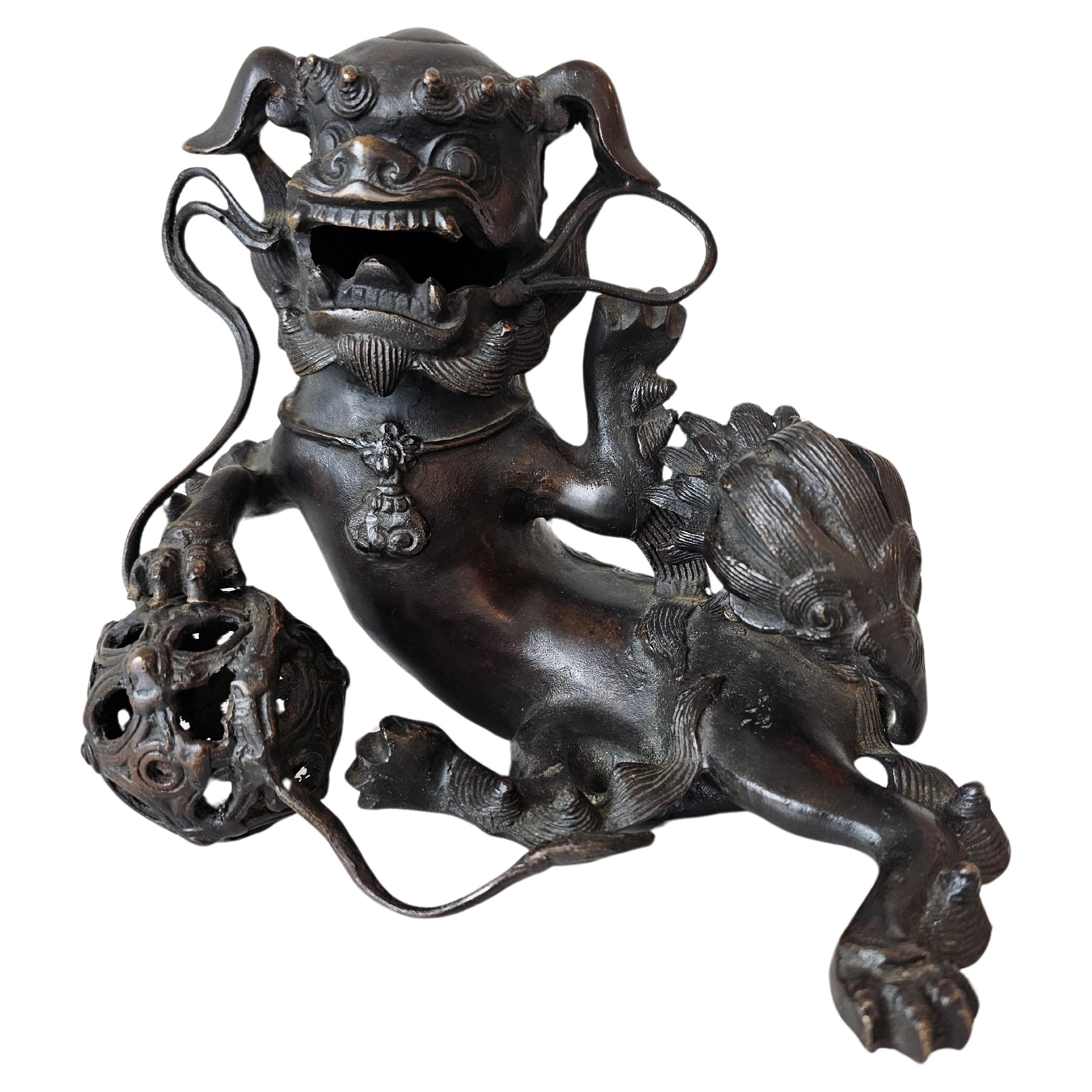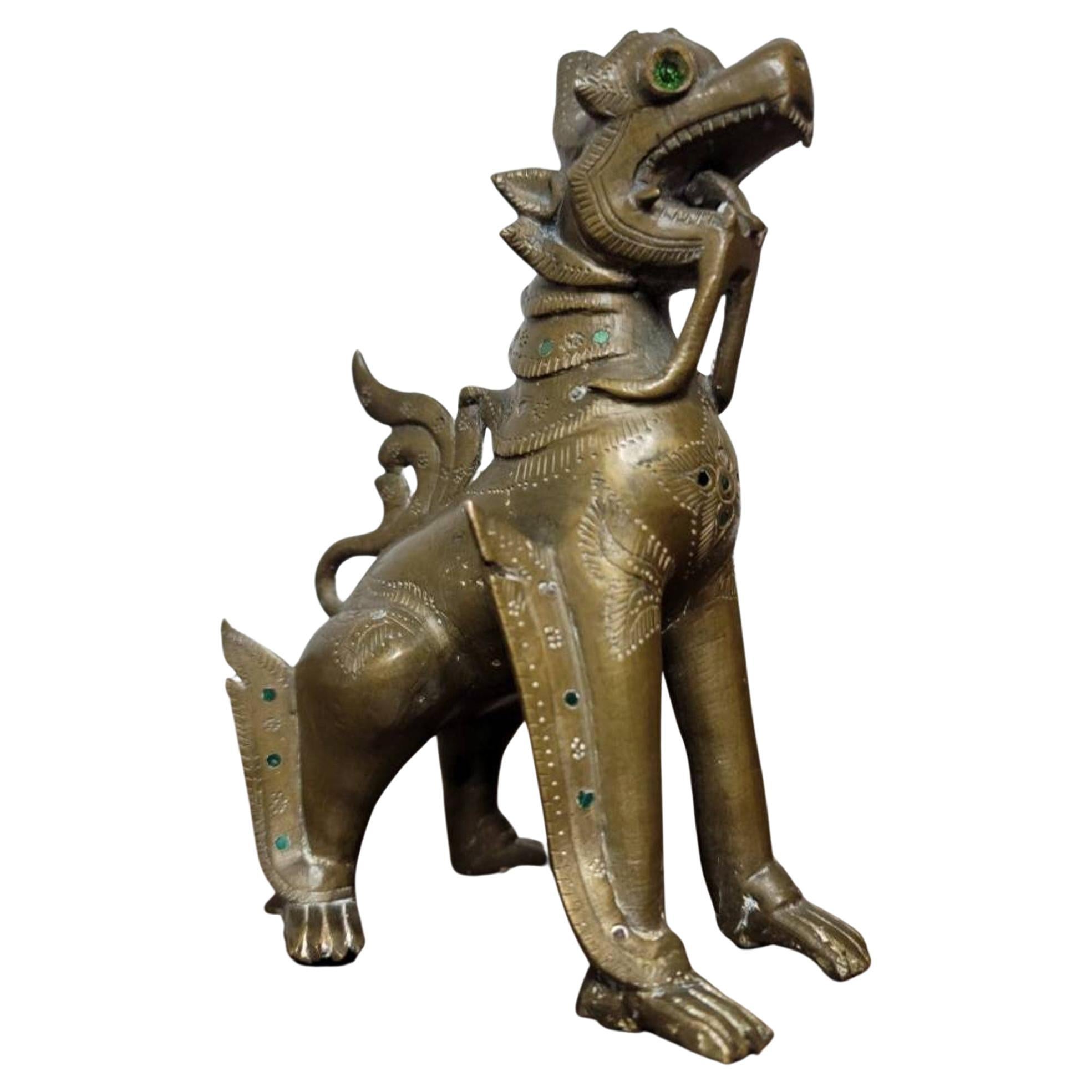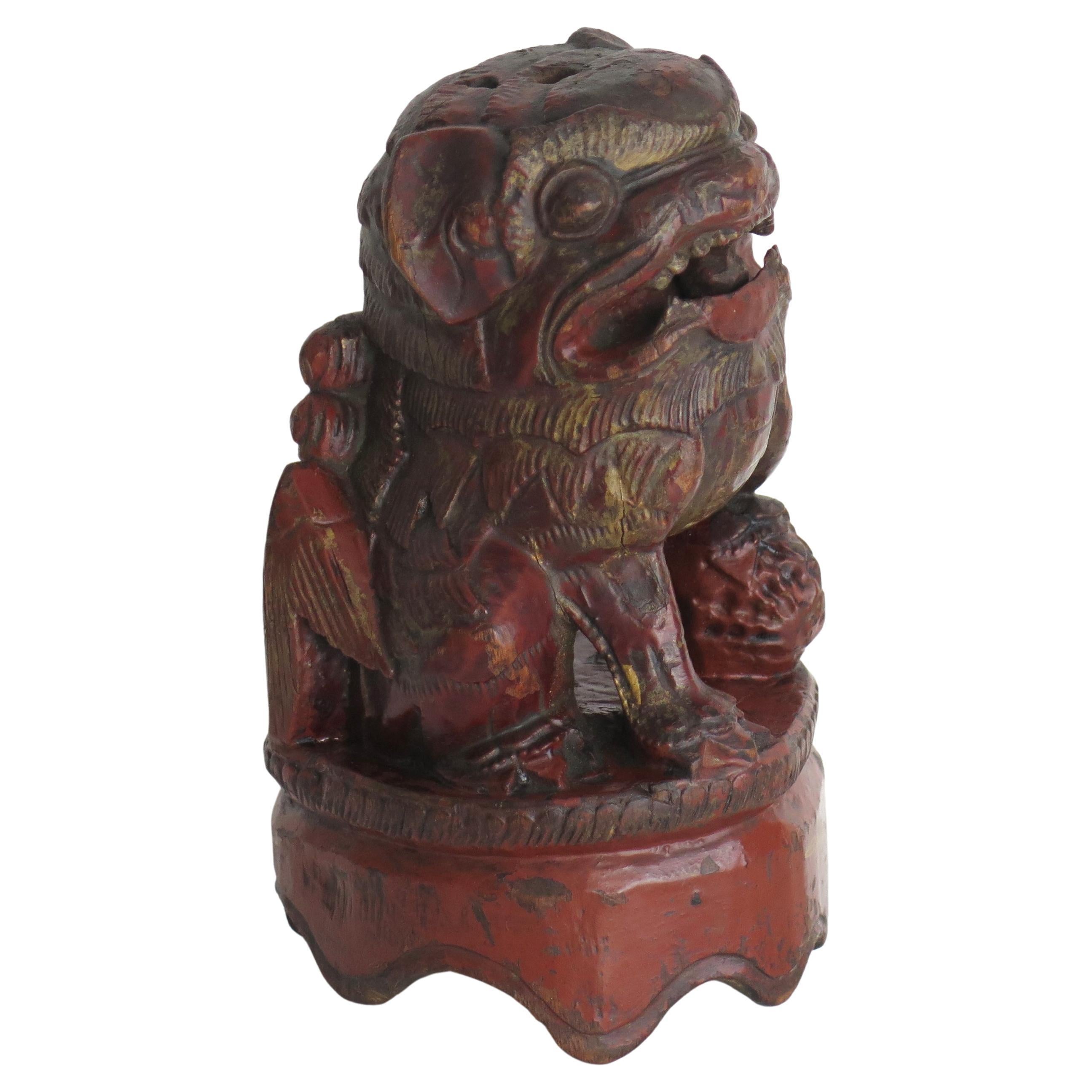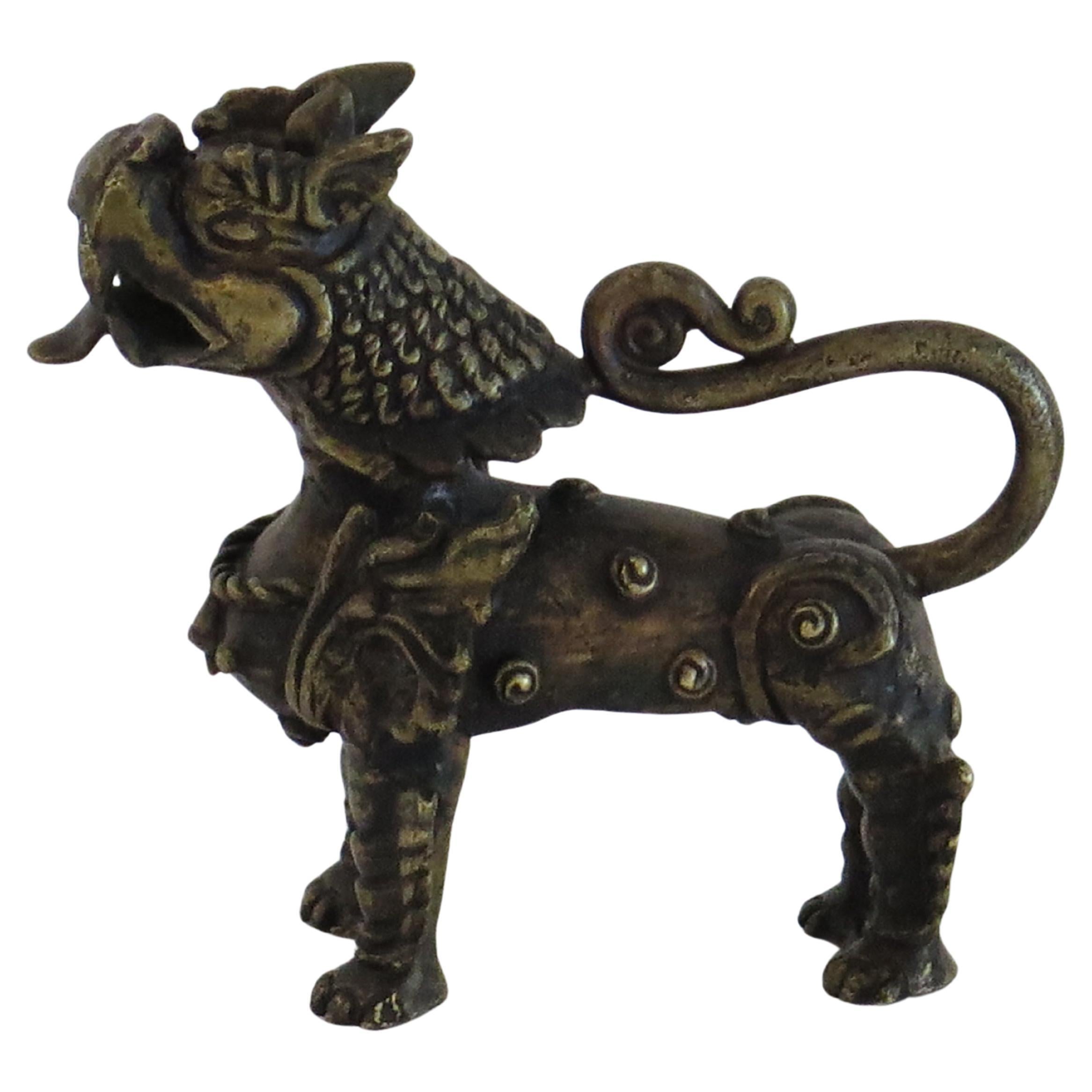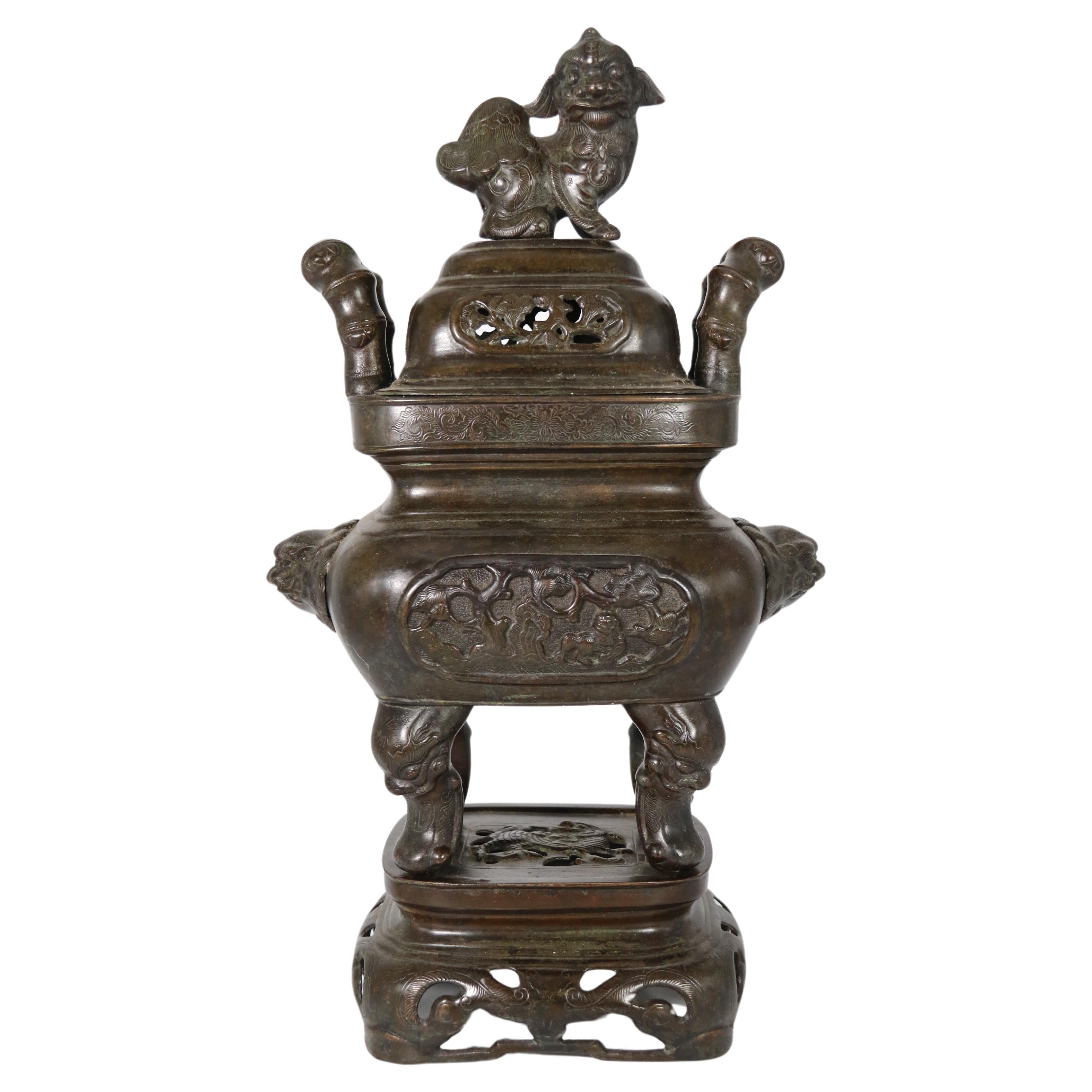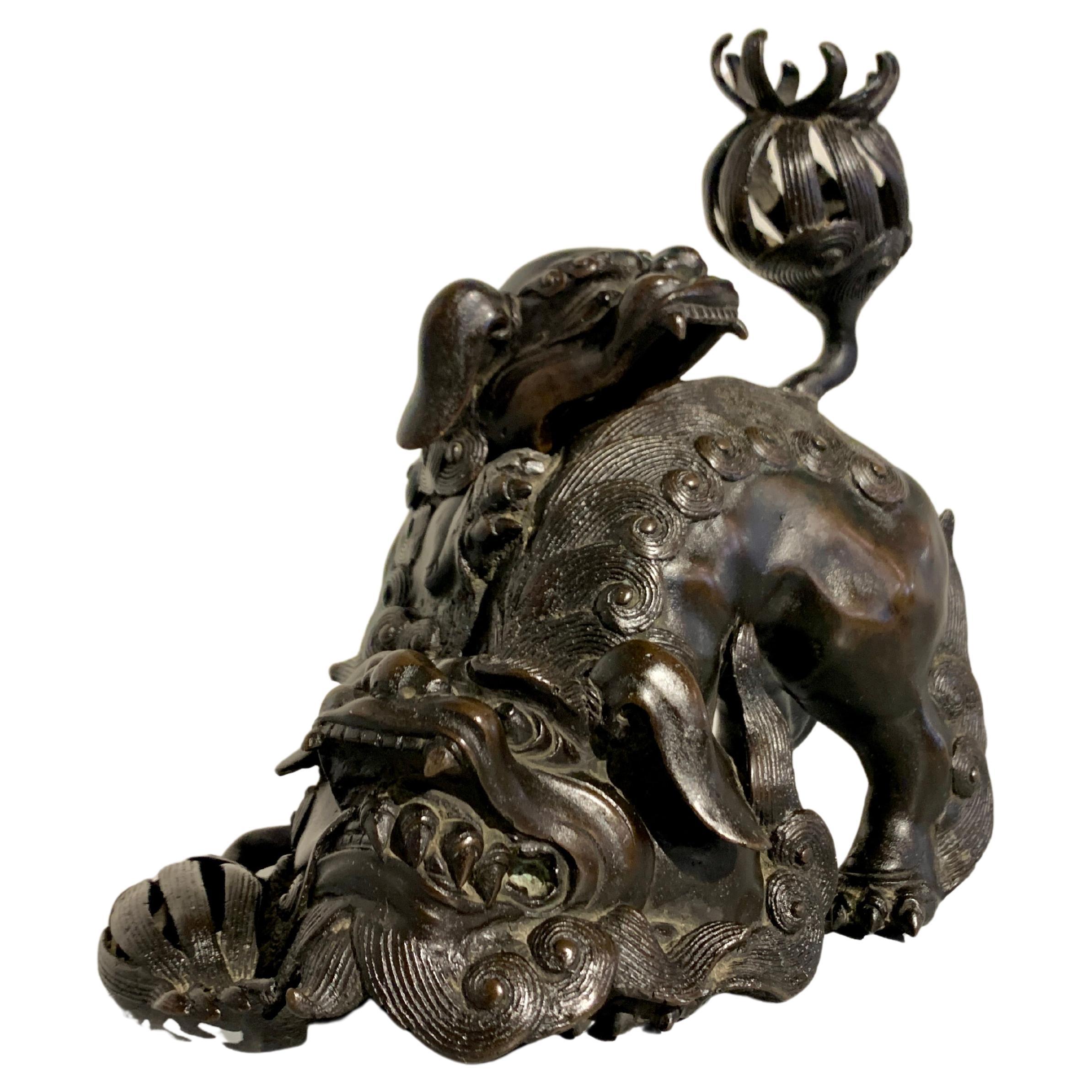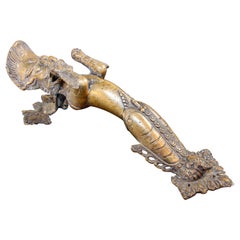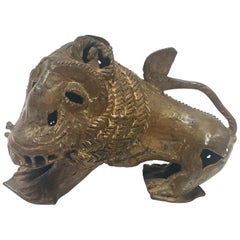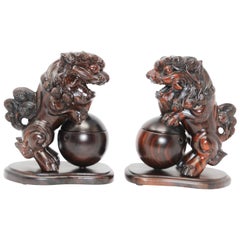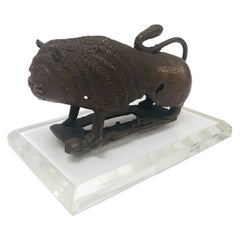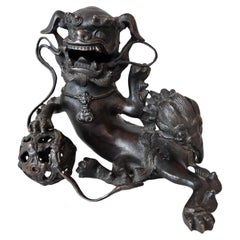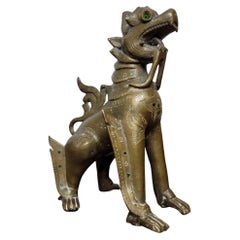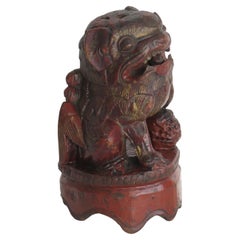Items Similar to Antique Mythical Tiger Finial Bronze Palanquin Handle 18-19th Century
Video Loading
Want more images or videos?
Request additional images or videos from the seller
1 of 18
Antique Mythical Tiger Finial Bronze Palanquin Handle 18-19th Century
$2,500
£1,889.69
€2,171.59
CA$3,481.23
A$3,872.73
CHF 2,030.13
MX$47,323.83
NOK 25,851.22
SEK 24,335.35
DKK 16,210.10
Shipping
Retrieving quote...The 1stDibs Promise:
Authenticity Guarantee,
Money-Back Guarantee,
24-Hour Cancellation
About the Item
Antique 18th 19th Century Palanquin Mythical Lion or Tiger Finial Bronze Handle.
Large heavy Indian Mythological bronze palanquin fitting cast via the lost wax technique, beautifully stylized and crafted in the form of protective mythological creature.
Palanquin finials were used to adorn the pole ends of the palanquin or palki.
A fine and massive example of a palanquin pole finial with good detail and fine patina.
India, circa: 18th/19thc.
The Palanquin handle measures: 9 inches long x 4 inches in depth x 6 inches height.
"Palanquin, or “palki”, are litter-type conveyances that have been in use in India for centuries. These finials would have adorned the pole ends that were used to support and carry the passenger compartment.
18th-19th century palanquin mythical beast finial handle in bronze, in a nice rich dark brown patina, unpolished (as found condition). Palanquins were used for transportation of people of wealth and power in India and the East. Palanquin finial/handles were decorative caps on the poles and were meant to protect the person being carried in the palanquin from demons and evil spirits.
These Palanquin handle were used to slide a wooden pole trough which carried a litter. The adornments of the carriage was meant to display the wealth and importance of their passengers. This is clearly visible in the details of these objects which are Masterly crafted.
The word “palanquin” is derived from the Sanskrit “palanki” meaning “bed” or “couch”. These lushly covered conveyances were intended to be carried by four to eight bearers known as “behara”, “dulia”, “boyee” or “behara” depending on the region. The interiors were furnished with specialized bedding materials, including pillows to provide the utmost comfort while traveling. Though the earliest mention of palanquin dates to the 3rd century BCE in the epic poem Ramayana, the height of usage occurred during the Mughal era from the 16th through 19th centuries. It wasn't until the advent of railways and roadways that could accommodate wheeled modes of transportation that the use of palanquin fell out of favor. Today, these bygone conveyances are used in ceremonies such as weddings. The ornamentation and complexity palanquin was directly related to social status. The finials also abided by this convention, but these adornments also reflected whether the owner was male or female. Flowers, particularly lotuses, and birds were the typical forms found on women’s palanquin, while those for men often featured fierce animals and creatures from Indian mythology and folklore. Similar palanquin finials can be found in the collections of the Victoria & Albert Museum in London and New York's Metropolitan Museum of Art. The Heritage Transport Museum in Taoru, India has an entire exhibit devoted to palanquin with varied finials on display."
Provenance: private southern California, USA collection.
- Dimensions:Height: 6.5 in (16.51 cm)Diameter: 9 in (22.86 cm)
- Style:Folk Art (In the Style Of)
- Materials and Techniques:Bronze,Cast
- Place of Origin:
- Period:
- Date of Manufacture:1800
- Condition:Wear consistent with age and use.
- Seller Location:North Hollywood, CA
- Reference Number:Seller: LP1231stDibs: LU906832505952
About the Seller
5.0
Platinum Seller
Premium sellers with a 4.7+ rating and 24-hour response times
1stDibs seller since 2011
3,056 sales on 1stDibs
Typical response time: 1 hour
- ShippingRetrieving quote...Shipping from: North Hollywood, CA
- Return Policy
Authenticity Guarantee
In the unlikely event there’s an issue with an item’s authenticity, contact us within 1 year for a full refund. DetailsMoney-Back Guarantee
If your item is not as described, is damaged in transit, or does not arrive, contact us within 7 days for a full refund. Details24-Hour Cancellation
You have a 24-hour grace period in which to reconsider your purchase, with no questions asked.Vetted Professional Sellers
Our world-class sellers must adhere to strict standards for service and quality, maintaining the integrity of our listings.Price-Match Guarantee
If you find that a seller listed the same item for a lower price elsewhere, we’ll match it.Trusted Global Delivery
Our best-in-class carrier network provides specialized shipping options worldwide, including custom delivery.More From This Seller
View AllVintage Buddhist Bronze Protector Deity Statue Door Handle
Located in North Hollywood, CA
Vintage Buddhist protector deity statue bronze heavy, ornate, symbolic, fertility symbol door handle from old temple
Heavy bronze door handle in the ...
Category
Early 20th Century Nepalese Tibetan Metalwork
Materials
Bronze
Antique Bronze of a Mythical Lion Beast
Located in North Hollywood, CA
An antique unusual cast bronze of a Mythical lion beast.
Bursting with character, the lion standing foursquare with his long tail curled back on itself.
Cast bronze.
Tribal Afric...
Category
Early 20th Century African Folk Art Animal Sculptures
Materials
Bronze
Two Chinese Wood Lion Foo Dogs Incense Holder
Located in North Hollywood, CA
Two Chinese wood Foo Dogs Incense holder burners.
Featuring a pair of highly detailed lion foo dogs, one male and one female which were thought to protect the home from harmful spiritual influences and harmful people that might be a threat.
The Foo Dogs...
Category
Late 20th Century Chinese Chinese Export Sculptures and Carvings
Materials
Wood
Antique Cast Bronze of a Mythical Lion Beast
Located in North Hollywood, CA
An antique unusual cast bronze of a Mythical lion beast.
Bursting with character, the lion standing foursquare with his long tail curled back on itse...
Category
Early 20th Century African Folk Art Animal Sculptures
Materials
Bronze
Tibetan Bronze Horse Door Pull Handle Jumping Male Animal Shape Set of 4
Located in North Hollywood, CA
Tibetan Bronze Horse Door Pull Handle Jumping Male Animal Shape Door Pull.
Set of four Flying Horse Door Pull Handle Door Hardware.
Brass Temple Door Handle Fertility Symbol, Nepal...
Category
Mid-20th Century Nepalese Tibetan Metalwork
Materials
Bronze
Antique Asian Bronze Elephant Sculpture Statue 19th c.
Located in North Hollywood, CA
Antique Asian Bronze Elephant Sculpture Statue late 19th c.
Asian Chinese antique cast bronze elephant sculpture.
Ceremonial cast metal elephant with beautiful detailed carving on hi...
Category
Antique Late 19th Century Chinese Chinese Export Animal Sculptures
Materials
Bronze
You May Also Like
Antique Japanese Patinated Bronze Buddhistic Lion Censer 17th/18th Century
Located in Forney, TX
A remarkable Edo Period (1603-1868) Japanese patinated bronze Buddhistic lion censer, exceptionally executed sculptural shishi foo dog form, finely detailed, retaining the original r...
Category
Antique 18th Century Japanese Edo Metalwork
Materials
Bronze
19th Century Burmese Jewel Inlaid Bronze Temple Guardian
Located in Forney, TX
A scarce, high-quality antique Burmese jewel inlaid solid bronze chinthe sculpture.
Dating to the late 19th century, likely originating in the Mandalay region of central Burma, the fearsome looking beast depicted in traditional Burmese iconography and important architecture, especially as a pair, the protective temple guardians placed flanking the entrances of Buddhist religious pagodas and monasteries.
Burma; circa 1880
PROVENANCE:
The estate of Mr. Wesley and Mrs. Suzanne LaFever, Beverly Hills, California.
ACQUISITION:
We acquired this outstanding example from the reputable auction house, Austin Auction Gallery, Austin, Texas. Fine Estates and Antiques catalog, December 2021
DESCRIPTION:
Exquisitely sculpted and cast of heavy, patinated solid bronze, finely detailed and decorated throughout, intricately engraved with scrolling ornamentation and fine detailing work, old nicely aged polished finish developing a warm, mellow patina with highly desirable scattered verdigris, minor inlay losses add to the charming antique character.
Stoic in stance, posed at attention proudly squatting back on its haunches, front legs straight, possibly roaring with head up and straight ahead, mouth ajar with teeth and long tongue exposed, ornate armor plating and horned mane, fanciful stylized tail, inset with Myanmar style brilliant colored mirrored glass jewels.
BRIEF HISTORY / BACKGROUND:
Predating the use of coins for money, brass weights cast in the shape of iconic animals like the Chinthe were commonly used to measure standard quantities of staple items.
Chinthe, the Burmese word for lion, while leograph of Chinthe is an artistic highly stylized lion; the rare Southeast Asian Burmese equivalent to Foo Dogs, Japanese Komainu, Tibetan Snow Lion...
Category
Antique Late 19th Century Asian Sculptures and Carvings
Materials
Bronze
Antique Chinese Foo Dog Hand Carved Bamboo Gilded, 19th Century Qing
Located in Lincoln, Lincolnshire
This is a good Chinese hand carved bamboo Foo or Lion Dog, sometimes called a temple lion that we date to the 19th Century Qing period.
T...
Category
Antique 19th Century Chinese Qing Ceramics
Materials
Bamboo
$387 Sale Price
56% Off
Antique Chinese Bronze Foo Dog Sculpture with good detail, Qing 19th Century
Located in Lincoln, Lincolnshire
This is a very good antique Chinese foo or lion dog sculpture, sometimes called a temple lions, made of bronze, with excellent detail, dating to the 19th century, Qing period or poss...
Category
Antique 19th Century Chinese Qing Metalwork
Materials
Bronze
19th century Chinese bronze cencer with Buddhist lion decoration circa 1860
Located in Central England, GB
This large Chinese bronze censer dates to circa 1860. It is made in three parts, stand, vessel, and lid. The lid has pierced decorative panels with pine trees and a bold Buddhist lion finial for lifting.
The censer has lifting handles in the shape of bamboo to each side and again also has panels with pine forests with mythical beasts and side mounts in the form of Buddhist lion mastheads.
It is raised on four shaped legs with a beast mask head at the top and sits on the raised and pierced stand.
The decoration on this piece is all hand finished with chasing and engraving giving good detail.
The censer has a green/brown patina. Circa 1860
Censers are a type of vessel for burning incense. In many cultures burning incense has spiritual and religious connotations which influence the design and decoration of the censer.
The lion is one of Buddhism’s most potent symbols. Traditionally the lion is associated with regality, strength and power. It is therefore an appropriate symbol of Buddha who, tradition has it, was a regal prince. As Buddhist priests and monks from India, they brought with them stories of stone Asiatic lions...
Category
Antique Mid-19th Century Chinese Chinese Export Metalwork
Materials
Bronze
Chinese Bronze Fighting Foo Lions Censer, Qing Dynasty, Late 19th Century, China
Located in Austin, TX
A fantastic Chinese cast bronze censer in the form of two Buddhistic lions play fighting, late Qing Dynasty, late 19th century, China.
The censer formed as a pair of Buddhistic li...
Category
Antique Early 1900s Chinese Qing Sculptures and Carvings
Materials
Bronze
